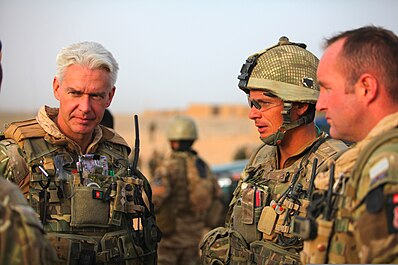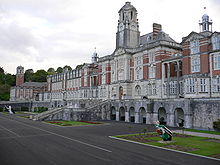Officer (armed forces)
[4][5] In the Israel Defense Forces, a university degree is a requirement for an officer to advance to the rank of lieutenant colonel and beyond.The first, and primary route are those who receive their commission directly into the officer grades following completion at their relevant military academy.[8][9] In the British Army, commissioning for DE officers occurs after a 44-week course at the Royal Military Academy Sandhurst.[18] Army ROTC graduates of the United States' four junior military colleges can also be commissioned in the U.S. Army with only a two-year associate degree through its Early Commissioning Program, conditioned on subsequently completing a four-year bachelor's degree from an accredited four-year institution within a defined time.PLC is a sub-element of Marine Corps OCS and college and university students enrolled in PLC undergo military training at Marine Corps Officer Candidate School in two segments: the first of six weeks between their sophomore and junior year and the second of seven weeks between their junior and senior year.There is no routine military training during the academic year for PLC students as is the case for ROTC cadets and midshipmen, but PLC students are routinely visited and their physical fitness periodically tested by Marine Corps officer-selection officers (OSOs) from the nearest Marine Corps officer-recruiting activity.In the United States Armed Forces, enlisted military personnel without a four-year university degree at the bachelor's level can, under certain circumstances, also be commissioned in the Navy, Marine Corps and Coast Guard limited duty officer (LDO) program.These are specialist officers who do not require a bachelor's degree and are exclusively selected from experienced mid- to senior-level enlisted ranks (e.g., E-5 with eight years' time in service for the Marine Corps, E-7 and above for Navy and Coast Guard).Their difference from line and staff corps officers is their focus as single specialty/military occupational field subject-matter experts, though under certain circumstances they can fill command positions.Credentialed civilian professionals such as scientists, pharmacists, physicians, nurses, clergy, and attorneys are directly commissioned upon entry into the military or another federal uniformed service.During the U.S. participation in World War II (1941–1945), civilians with expertise in industrial management also received direct commissions to stand up materiel production for the U.S. armed forces.Many of these individuals, at the time all male, declined or resigned their inactive USAF commissions and also attended AOCS for follow-on naval flight-training.After their initial operational tour, they could be assigned to a college or university full-time for no more than two years in order to complete their bachelor's degree.They would then report to The Basic School (TBS) for newly commissioned USMC officers at Marine Corps Base Quantico prior to reporting to a replacement air group (RAG)/fleet replacement squadron (FRS) and then to operational Fleet Marine Force (FMF) squadrons.Aviation cadets were later offered the opportunity to apply for a commission in the regular Air Force and to attend a college or university to complete a four-year degree.Education standards for non-commissioned members are typically lower than for officers (with the exception of specialized military and highly-technical trades; such as aircraft, weapons or electronics engineers).In the U.S. military, a warrant officer is a technically focused subject matter expert, such as helicopter pilot or information technology specialist.Officers who are non-commissioned usually receive management and leadership training, but their function is to serve as supervisors within their area of trade specialty.Officers in nearly every country of the world are segregated from the enlisted soldiers, sailors, airmen, marines and coast guardsmen in many facets of military life.This system is focused on discouraging fraternization and encouraging professional and ethical relations between officers and enlisted military personnel.




Comparative military ranksGeneral officersFlag officersAir officersField marshalAdmiral of the fleetMarshal of the air forceGeneralcolonel generalarmy generalAdmiralAir chief marshalLieutenant generalarmy corps generalVice admiralAir marshalMajor generaldivisional generalRear admiralCounter admiralAir vice-marshalBrigadierbrigadier generalCommodoreflotilla admiralAir commodoreSenior officersColonel(Ship-of-the-line)CaptainGroup captainLieutenant colonelFrigate captainCommanderWing commandercommandantCorvette captainLieutenantcommanderSquadron leaderJunior officersCaptainLieutenantFlight lieutenantFirst lieutenantLieutenantjunior gradesub-lieutenantFlying officerSecond lieutenantjunior lieutenantEnsignmidshipmanPilot officerNon-commissioned officersWarrant officersergeant majorchief petty officerSergeantPetty officerCorporalbombardierLeading seamanEnlisted ranksLance corporalLance bombardierSpecialistAble seamanLeading aircraftmanAir specialistPrivategunnertrooperSeamanAircraftmanairmanaviatorarmed forceuniformed servicenon-commissioned officercommissionhead of stateMilitary academyleadershipmanagementmilitary occupational specialtyuniversity degreesAustralian Defence ForceBritish Armed ForcesNepali ArmyPakistan Armed ForcesSwiss Armed ForcesSingapore Armed ForcesIsrael Defense ForcesSwedish Armed ForcesNew Zealand Defence ForceaircrewRoyal NavyBritannia Royal Naval Collegewarrant officersBritish ArmyRoyal Military Academy SandhurstArmy ReserveOfficers' Training CorpsRoyal Air ForceRAF College CranwellRoyal MarinesCommando Training Centre Royal MarinesCardwell Reformspurchasedcoversuniformed services of the United Statesarmed forces of the United StatesUnited States Air ForceUnited States Space Forcewarrant-officernoncombatantUnited States Public Health Service Commissioned CorpsNational Oceanic and Atmospheric Administration Commissioned Officer Corpscommanding officersauthorityUnited States Military Academysecond lieutenantsU.S. ArmyUnited States Naval AcademyU.S. NavyU.S. Marine CorpsUnited States Air Force AcademyU.S. Air Force